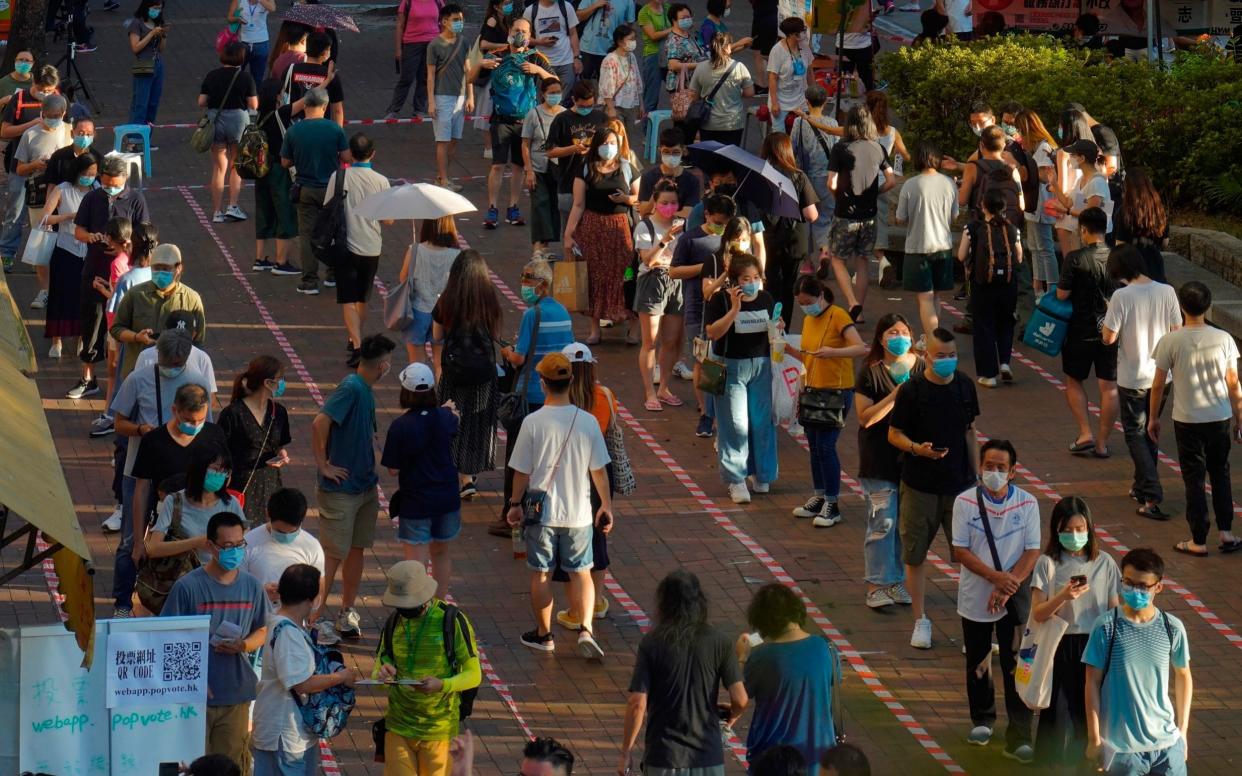More than 50 activists arrested in Hong Kong in biggest crackdown since new law introduced

At least 53 pro-democracy activists in Hong Kong were arrested Wednesday for allegedly breaching national security in the biggest sweep since the contentious law came into effect.
Six were arrested for organising a public opinion poll held last year to identify popular pro-democracy candidates to stand in city parliament elections against the pro-Beijing majority. The remaining 47 others were arrested for participating in the polls, said Hong Kong police.
A thousand officers were dispatched to 72 different locations across Hong Kong to make the mass arrests, including recently ousted lawmakers Alvin Yeung and Kwok Ka-ki, and former law professor Benny Tai, one of the main poll organisers and a prominent activist.
Others arrested were members of Hong Kong’s Democratic Party, the city’s largest opposition group, including former chairman Wu Chi-wai, the group said in an online post.
City authorities had previously warned the polls could be considered a violation of a draconian national security law imposed on Hong Kong by China’s ruling Communist Party. But Hong Kong’s pro-democracy camp pushed forward with the unofficial primary in hopes of winning a majority in the 70-seat Legislative Council to filibuster unfavourable proposals and push for greater democratic reforms.
John Lee, Hong Kong’s security chief, said the plan to get pro-democracy candidates elected into a parliamentary majority ensured “mutual destruction” as it aimed “to create a situation in which the Chief Executive has to resign and [for] the government [to] stop functioning.”

China’s foreign ministry accused those arrested for subversion saying “police action was necessary and essential” as Hong Kong authorities couldn't tolerate such crimes.
Human rights groups, however, condemned Wednesday’s arrests as “the starkest demonstration yet of how the national security law has been weaponised to punish anyone who dares to challenge the establishment,” said Yamini Mishra, Asia-Pacific regional director for human rights group Amnesty International.
“This ruthless legislation gives the Beijing and Hong Kong authorities free rein to crush any dissenting views and puts all government critics at risk of imprisonment,” she continued in a statement. “Political opposition should not be silenced just because the authorities don’t like it.”
The Legislative Council election itself, originally scheduled for September 2020, were later postponed for a year by Hong Kong authorities, citing the coronavirus pandemic.
In response to Hong Kong's political crackdown, I urge the European Parliament to halt the EU-China investment deal and EU to sanction China&HK officials who are responsible to the arrests.#Retweet if you agree MEP should VETO the bill and EU should act.#StandwithHongKong
— Nathan Law 羅冠聰 😷 (@nathanlawkc) January 6, 2021
Pro-democracy activists denounced the decision as yet another example of a widening crackdown. Since then, authorities have ousted and arrested already-elected sitting pro-democracy lawmakers in efforts to stamp out dissent.
“Beijing once again has failed to learn from its mistakes in Hong Kong: that repression generates resistance,” said Maya Wang, senior researcher for Human Rights Watch. “And that millions of Hong Kong people will persist in their struggle for their right to vote and run for office in a democratically elected government.”
Police raided the home of Joshua Wong, a prominent pro-democracy activist serving a 13.5 month prison sentence for participating in an unauthorised demonstration last year, according to a tweet on his account.
Officers also visited the headquarters of Stand News, an online news outlet, with a court order for documents as part of a national security investigation, as shown in a livestreamed video by the news organisation. No arrests were made during the visit.
Beijing imposed a national security law on Hong Kong last summer, which punishes what authorities consider as secession, subversion, terrorism and foreign collusion with up to life imprisonment.
The law itself has been condemned by the UK and other Western countries as a way to stamp out dissent in Hong Kong, the former British colony embroiled in protests last year.
Prominent Hong Kong activist Nathan Law, now in exile in the UK, called on the European to back out of a recently agreed EU-China investment deal, and to sanction officials responsible for the ongoing political crackdown.

